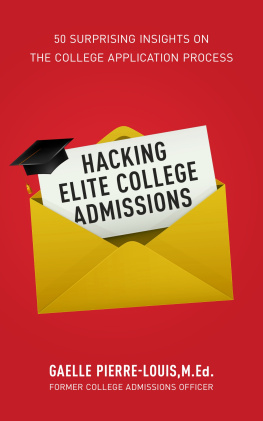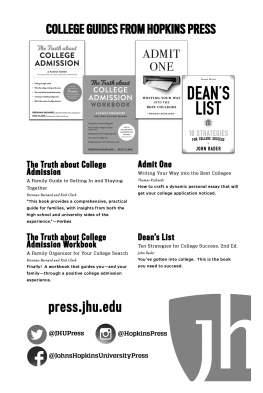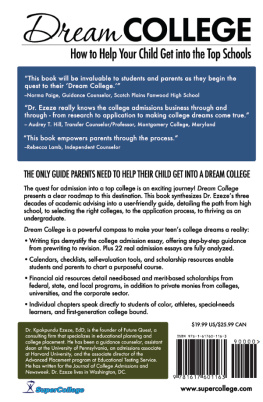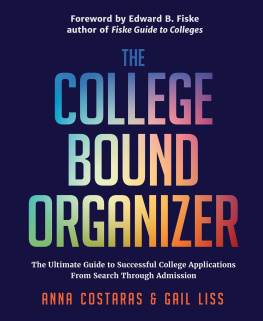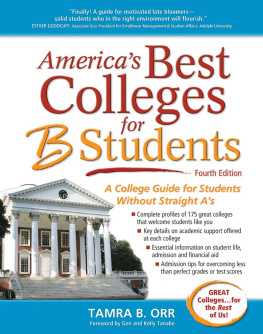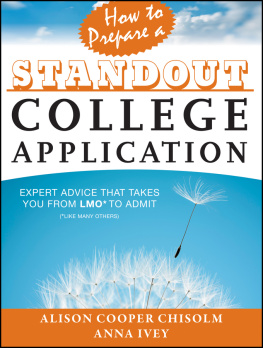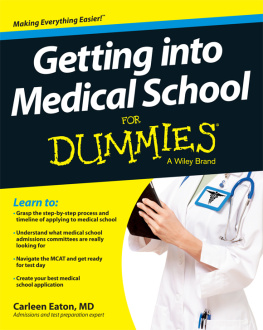Contents
Chapter 1
THE GATEKEEPERS
Section 1
Who are the gatekeepers?
Section 2
What is the role of the guidance counselor?
Section 3
Whom should I ask to write my college recommendation letters?
Section 4
Is receiving help from college admissions consultants okay?
Section 5
How can I effectively communicate with coaches as a student athlete applicant?
Chapter 2
PREPARE FOR SUCCESS
Section 6
What is the best way to demonstrate interest in my dream school?
Section 7
Which questions should I ask during a college tour or information session?
Section 8
How important is social media presence in the college process?
Section 9
What is the protocol around sending gifts in the college process?
Section 10
How should I prepare for college interviews?
Chapter 3
Apply, Apply, Apply
Section 11
Which is the better option : Common Application vs. Coalition Application?
Section 12
Should I submit supplementary materials to colleges?
Section 13
Should I take the SAT or the ACT examination?
Section 14
Should I submit additional test scores other than the SAT or ACT?
Section 5
What are common things to avoid when submitting your application?
Chapter 4
KNOWLEDGE IS POWER
Section 16
How do admissions officers evaluate high school transcripts?
Section 17
Which extracurricular activities should I list on my rsum?
Section 18
How can I build a balanced college list?
Section 19
Should I apply early or regular decision?
Section 20
What do colleges want to see in my application essays?
Chapter 5
EMBRACE WHAT MAKES YOU UNIQUE
Section 21
How do I apply to college as a homeschooler?
Section 22
How do I apply to college with legacy status?
Section 23
How do I apply to college as a first-generation college student?
Section 24
How do I apply to college as an undocumented student?
Section 25
How do I apply to college as an LGBTQ student?
Chapter 6
UNDERSTAND THE PROCESS
Section 26
Does geography matter in the admissions process?
Section 27
Will attending a summer program at a university increase my chances of getting in?
Section 28
Is the admissions process different if I am an international student?
Section 29
What effect does indicating a major have on my application?
Section 30
How should I deal with disciplinary issues on my application?
Chapter 7
DO NOT PANIC
Section 31
How strict are the deadlines?
Section 32
What should I do if I have missing materials after the deadline?
Section 33
How do admissions committees work?
Section 34
Is appealing admissions decisions possible?
Section 35
What is the best way to approach the transfer admissions process?
Chapter 8
MAKING THE DECISION : WHATS NEXT?
Section 36
How should I choose which college to attend?
Section 37
What steps should I take if I am placed on the waitlist?
Section 38
What are ethical issues I should know regarding double depositing and early applications?
Section 39
How important are my midyear and final transcripts during senior year?
Section 40
How should I put in a gap year request?
Chapter 9
SECURE THE FUNDING : PART 1
Section 41
Does applying for financial aid hurt my chances of admission?
Section 42
Do I qualify for a fee waiver or enrollment deposit deferral?
Section 43
What are the hidden costs of applying to college that I should be aware of?
Section 44
How can I qualify for in-state versus out-of-state tuition benefits?
Section 45
Is there a way to appeal financial aid awards?
Chapter 10
SECURE THE FUNDING : PART 2
Section 45
Will ROTC provide me with a full scholarship?
Section 46
What are the most common mistakes found when filling out the FAFSA and CSS Profile?
Section 47
What are the financial aid options available for students in foster care?
Section 48
What are the financial aid options available for international students?
Section 49
How can I use the net price calculator to predict my financial award package?
There is not just one attribute that colleges are looking for from applicants. In fact, we are looking for students who have different skills and talents in order to build a brilliant and diverse class. We compare this to an orchestra. An orchestra recruits musicians with different instrumental talents in order to make a beautiful sound. An orchestra with just violin players is not enough. Similarly, a college needs students with a variety of talents, skills, and backgrounds in order to achieve its higher education mission.
Exploring College Options*
*Exploring College Options is a special recruitment program sponsored by the undergraduate admissions offices at five of the countrys leading universities: Duke University, Georgetown University, Harvard University, the University of Pennsylvania, and Stanford University.
About the Author
Gaelle Pierre-Louis, EdM, is a former college admissions officer and author of Hacking College Admission: 50 Surprising Insights on the College Application & Financial Aid Process. She holds a bachelors degree in foreign service from Georgetown University and a masters in education from Harvard University. During her time working as an admissions officer at Georgetown University, she read and evaluated over two thousand applications for undergraduate admission and made admit, deny, defer, and waitlist recommendations to the Dean of Admissions. She also traveled extensively, speaking to large audiences of students, parents, and school counselors about the undergraduate admissions process. When she is not sharing her expertise with others, she enjoys playing piano and traveling.
FOREWORD
I love to go on early morning walks. It helps me center, and to think about my goals for the day and week ahead. Sometimes I also reflect on my journey - and the distance Ive traveled from my very modest childhood in Corvallis, Oregon.
When I applied to college and matriculated in 1992, the internet did not exist. My guidance counselor was kind, but she only had time to meet with me once. During our conversation she handed me a thick book on colleges and said to return it to her in two weeks - essentially communicating that I was on my own to figure things out. Fortunately, I was determined to go to college - but the figuring-it-out part was, as is often the case for first-gens, black and brown kids and those from low-income families like mine - confusing and overwhelming. That said, I made it in and persisted through to graduation.

